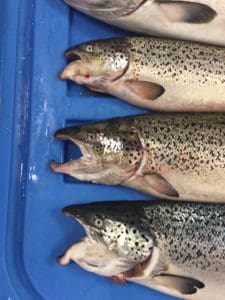UPDATE – Cypress Island Farmed Fish Disaster
Atlantic Salmon in Washington State
It’s been a little over a week since the Cypress Island farmed fish disaster, and it’s all hands on deck as cleanup efforts move forward.

Deformed Farmed Atlantic salmon caught in the Salish Sea
The headlines keep rolling in:
- Native anglers have caught 20,000 farmed Atlantic salmon in Puget Sound
- Scramble to remove Atlantic salmon from Salish Sea continues
- Washington agencies unify response to Cooke escape as 119,000 fish removed
- Conservation group to sue Cooke over salmon escape
There is a lot of misinformation being perpetuated around both the farmed fish industry, and surrounding this particular indecent. We wanted to take a moment and give a rebuttal to some of the arguments made by farmed salmon advocates and their mouth pieces in traditional and social media:
Cooke Aquaculture states that their genetically modified salmon can’t spawn
The reality here is that salmon don’t need to physically spawn to have detrimental up-river outcome. GMO farmed salmon can still compete for spawning ground, regardless if they can do the final deed. They can dig reeds, fend off fish that would otherwise be successful spawners. Bottom line is these escaped farmed salmon can still demonstrate aggressive spawning behavior and interfere with wild fish.
Cooke Aquaculture and the farmed salmon industry reps says that these escaped farmed salmon don’t compete for food.
Some even say that “last time” this happened -all they found in their stomachs was cigarette butts and gravel. So, in response to this, we simply ask – if these escaped swimming locust aren’t feeding, why are they biting fishermen’s hooks?
Farmed salmon would normally receive testing before going out to market.
Despite this fact, no one is asking if they are safe to eat. These fish treated for yellow mouth with antibiotics and other chemicals-just this past July. Suggesting to the public that this is just a free seafood bonanza is completely irresponsible.
Know what you’re eating
Now- more than even, it’s critical that you have a trusted source for your seafood. Lummi island wild catches in a year what other fisheries scoop up in a day. We are entirely focused on quality, not quantity. Whether you buy your seafood directly from us on our website, or your work with a trusted local source, believe the NY Times when they say 43 % of seafood is incorrectly labeled as wild -when it is actually farmed.
You can feel great about eating all LIW seafood – it healthy, sustainable, wild, and harvested without hurting the environment. If you agree – consider yourself on our crew – and welcome. Sign up for email updates and please support our efforts!

